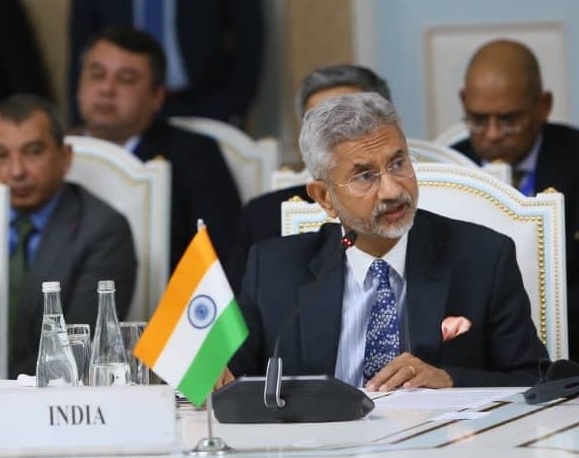

External Affairs Minister S Jaishankar (Image courtesy: Twitter/@DrSJaishankar)
Soon after the curtains have been drawn in the 20th Party Congress in Beijing, Chinese diplomats have begun to signal their apparent intent to re-engage with a sceptical India.
Soon after outgoing ambassador of China to India Sun Weidong said that there was enough room for the “dragon and the elephant” to work constructively together despite differences, Beijing’s ambassador to Bangladesh sang a similar tune.
China never views India as a strategic rival or strategic competitor, Chinese Ambassador to Bangladesh Li Jiming said. “We never view India as a strategic rival or strategic competitor of China,” he was quoted as saying by The Dhaka Tribune.
The Chinese envoy said he is personally a big fan of India, and he used to travel to many Indian places and made many friends, the daily reported.
With the United States as the elephant in the room, he called for resolving all the problems in the region in an “Asian way” and said that is the basic intention of China.
The sugary remarks by the two ambassadors follow the conclusion of the 20th Party Congress, a half-a-decade event. There are few takers in India who say that there has been a strategic-shift in China’s approach towards New Delhi. The border de-escalation has more or less stalled, and practical action to indicate a change of heart in Beijing has failed to materialise.
Besides, the elevation of former foreign minister and state councillor Wang Yi to the head of the Central Foreign Affairs Commission (CFAC) has only triggered a watchful response in New Delhi. From the larger and less powerful Central Committee of the Communist Party of China (CPC), Wang has entered the hallowed portal of the 24-member Politburo, one rung below the 7-member Standing Committee of the Politburo led by the Party General Secretary Xi Jinping himself. Wang is also expected to participate in Leading Groups—composite semi-cloaked clusters of the CPC that makes key decisions, with the ministries amplifying its decisions.
For India, its current stance towards China has been pegged by External Affairs Minister S. Jaishankar’s “eight-fold path”.
As reported by India Narrative earlier, Jaishankar had summed up “eight broad propositions” to stabilizing the India-China relationship while addressing the All-India Conference of China Studies, last year.
First and foremost, he said, was that agreements already reached must be adhered to in their entirety, both in letter and spirit.
Second, the LAC must be strictly observed and respected with any attempt to unilaterally change the status quo being completely unacceptable.
Third, he mentioned that peace and tranquillity in the border areas is the basis for the development of relations in other domains. If they are disturbed, so inevitably will the rest of the relationship.
Fourth, Jaishankar said, while both nations are committed to a multipolar world, there should be a recognition that a multi-polar Asia is one of its essential constituents.
Fifth, he said that relationships between major states are reciprocal in nature even as each state will have its own interests, concerns and priorities but sensitivity to them cannot be one-sided.
Sixth, as rising powers, each will have their own set of aspirations and their pursuit too cannot be ignored.
Seventh, there will always be divergences and differences but their management is essential to bilateral ties.
And eighth, Jaishankar stated, civilizational states like India and China must always take the long view.
On Wednesday, Jaishankar met the outgoing Chinese envoy to India and emphasized that peace and tranquillity in the border areas are essential to maintaining bilateral ties.
“Received Ambassador Sun Weidong of China for a farewell call. Emphasized that the development of India-China relations is guided by the 3 Mutuals. Peace and tranquility in the border areas is essential,” Jaishankar tweeted after meeting ambassador Sun.
“The normalization of India-China relations is in the interest of both countries, of Asia and the world at large,” he said in another tweet.
Also Read: Jaishankar makes it clear to China’s envoy that PLA troops must pull back from Ladakh border
Union Minister of Coal and Mines G Kishan Reddy on Tuesday held an inter-ministerial meeting…
India's largest automobile in-plant railway siding at Maruti Suzuki's Manesar facility started operation on Tuesday,…
Google on Tuesday unveiled its Safety Charter for India's AI-led transformation, at the "Safer with…
The human rights organisation of the Baloch National Movement (BNM), Paank, has published its most…
The Israel Defence Forces (IDF) on Tuesday claimed that it has killed Iran's senior-most military…
Amid escalating conflict between Iran and Israel, the Ministry of External Affairs (MEA) on Tuesday…